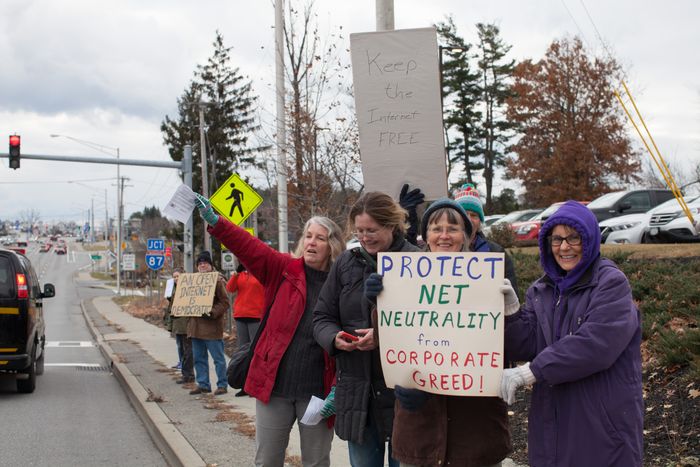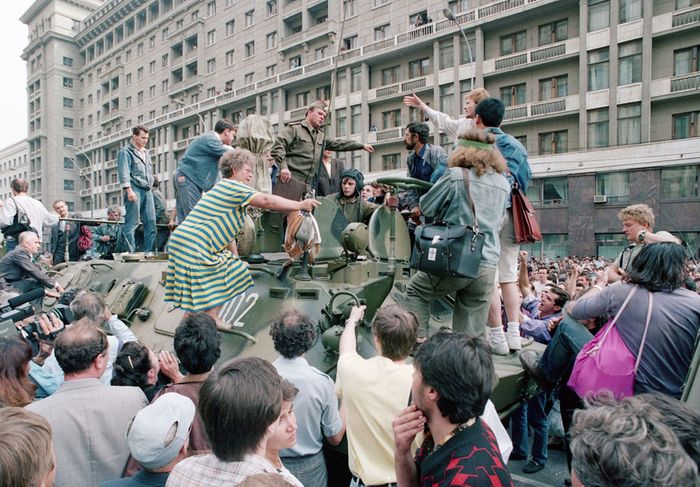
Solidarity from NYC

Decided to publish this message I just sent to a friend in Atlanta who emailed asking about how to find out when and where the protests are happening.
Thanks for the link, I’ll give that a read. It’s interesting how these dynamics of oppression seem to fit so neatly into historical precedent. How is it that us Americans think of ourselves as somehow immune to all of this?
We were out at JFK yesterday and it was a really great experience. Loud and angry, with overwhelming turnout. But honestly the smaller protests in lower-profile places in the world continue to be the ones that give me the most inspiration. It takes a lot more guts to show up for a tiny demonstration where you’re easily picked out of a crowd, or where small town dynamics make anonymous protest impossible.
BTW, I saw that Rep. John Lewis was out at ATL, just hanging out in the terminal until he got some answers. So awesome.
I feel like getting information about a protest is an ongoing challenge, especially at events that aren’t officially permitted by local government. There’s a kind of fine line to walk—organizers want to get the word out, for news of an event to spread. But if it’s technically an illegal gathering, it may be difficult to find “official” or consistent sources of good info. And this is where social media is helpful.
It’s a good time to get into Twitter I think, but the trick is in knowing who to follow and how to avoid feeling overwhelmed. My advice would be to find out people you know who went to protests in Atlanta, and just ask them to ping you next time they hear about something. For my part, I first heard about the JFK demonstration via Facebook Messenger (which I hate, but shit like this keeps me on it) from a friend who lives in LA, and then a couple hours later I got a mass email from an immigrant rights org. So maybe sign up for some email lists for local advocacy groups.
Anyway, good to know you’re thinking about this stuff! I am hopeful that we’ll continue to exercise our right to free assembly before things get even worse and it becomes too dangerous to protest (from police violence or stiffer court penalties). So in the interim, let’s go and put our various privileges to productive use while we can.
Solidarity from NYC,
Dan
Addendum
Good point from Paul, basically Facebook is still where things are happening.
Also, if you want to get out and protest today in New York City, go to Battery Park at 2pm.
Bill 78 and the casserole protest
From Common Dreams:
Bill 78 not only “enraged civil libertarians and legal experts but also seems to have galvanized ordinary Quebecers.” Since the law passed Friday, people in Montreal neighborhoods have appeared on their balconies and in front of their houses to defiantly bang pots and pans in a clanging protest every night at 8 p.m.
Gladwell vs. Shirky: A Year Later
Acts of communication, by themselves, aren’t especially interesting. We’ve always had protests, riots, and revolutions, and the people who carried them out have always found ways to spread the word. If the medium for those communications shifts from word of mouth, to printed flier, to telephone, then to texts and Twitter, what does it really matter? Technology becomes an important part of the story only if it’s changing the nature of the events — and the nature of the social groups that are carrying them out.
See also: How to run a protest without Twitter
Twenty years after the Soviet Union
Today’s In Focus shows the fall of the Soviet Union, culminating in the dissolution of the Communist Party on December 25th, 1991. The post includes an essay by Alain-Pierre Hovasse, Chief Photographer for the Agence France Presse, who was on assignment in Moscow.
We really had a notion that life here was changing dramatically, almost every day. Being a child of the Cold War, I remember feeling elated and privileged to be there at that time, to witness the apparent demise of this repressive political regime.

Occupy & Space
Astra Taylor writes about space and OWS in the third edition of the n+1 Occupy Gazette:
Space matters for Occupy. But when we seize it—whether it’s the sidewalk, the street, a park, a plaza, a port, a house, or a workplace—we must also claim the moral high ground so that others can be enticed to come and join us there. Occupy Our Homes made clear the connections between the domestic sphere and the financial sector: The occupation of abandoned bank-owned properties is actually a reclamation, a taking back of that which has been taken away, a recouping of something already paid for through other means (by unfairly ballooning monthly payments and the still-indeterminate government bail out, for example). The focus on Duarte Square, I fear, fails to draw the same kind of obvious unswerving link to the urgent issues that Occupy Wall Street emerged to address.
Occupy Wall Street at the Crossroads
Zuccotti Park was a sort of village square that thousands of people visited each day to get information, attend meetings and satisfy their curiosity about the movement. Every time I dropped by, I saw tourists arriving to gawk and leaving armed with leaflets and ideas to bring back to their own communities. It was a place where strangers immediately started talking to strangers—not small-talk about the weather but serious conversations about topics of genuine concern. People talking—and listening—to other people has been at the heart of the movement from its inception. … It is more crucial than ever for OWS to acquire a physical home base that members of the general public can visit. It should be either outdoors or in an easily accessible storefront location, ideally in Lower Manhattan, since this is the seat of economic power that is the central target of the movement’s efforts. The space can be rented, donated or occupied. But there needs to be a there there.
New York Times photographer being bullied by NYPD
There have been many reports of press suppression at Occupy Wall Street protests, but this is the most obvious example I’ve seen.
While we don’t have an exact copy of the memo, NYT’s VP and assistant general counsel George Freeman said:
It seemed pretty clear from the video that the Times freelance photographer was being intentionally blocked by the police officer who was kind of bobbing and weaving to keep him from taking photographs.
And while the NYPD’s department head has acknowledged receiving the note, there has been no response from Commissioner Kelly or one of his representatives. Because who needs to answer to journalists anymore?